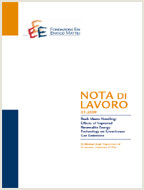The Effect of Risk, Ambiguity and Coordination on Farmers’ Adaptation to Climate Change: A Framed Field Experiment

05.06.2010
Francisco Alpizar, Fredrik Carlsson, Maria Naranjo
C93, D81, H41, Q16, Q54
Risk Aversion, Ambiguity Aversion, Technology Adoption, Climate change, Field Experiment
Climate Change and Sustainable Development
Carlo Carraro
The risk of losses of income and productive means due to adverse weather associated to climate change can significantly differ between farmers sharing a productive landscape. It is important to learn more about how farmers react to different levels of risk, under measurable and unmeasurable uncertainty. Moreover, the costs associated to investments in reduced vulnerability to climatic events are likely to exhibit economies of scope. We explore these issues using a framed field experiment that captures realistically the main characteristics of production, and the likely weather related losses of premium coffee farmers in Tarrazu, Costa Rica. Given that the region recently was severely hit by an extreme, albeit very infrequent, climatic event, we expected to observe, and found high levels of risk aversion, but we do observe farmers making trade-offs under different risk levels. Although hard to disentangle at first sight given the high level of risk aversion, we find that farmers opt more frequently for safe options in a setting characterized by unknown risk. Finally, we find that farmers to a large extent are able to coordinate their decisions in order to achieve a lower cost of adaptation, and that communication among farmers strongly facilitates coordination.
